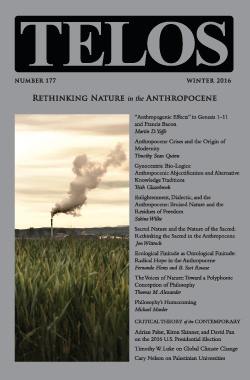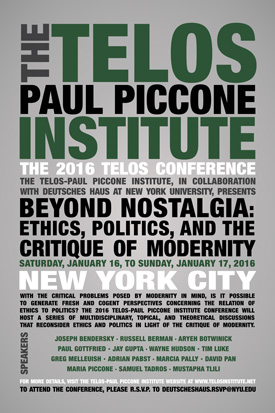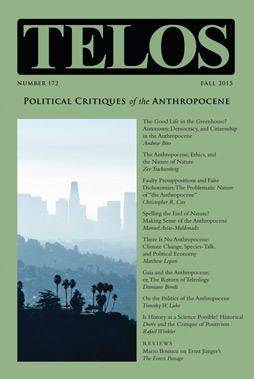The vulnerability we confront in the Anthropocene is what Jonathan Lear has called ontological vulnerability: the possible collapse of our world, that is, the collapse of the taken-for-granted way of life that guides and orients us in our everyday practices. In this paper, we take up Lear’s claim that in the face of the impending collapse of one’s world, a peculiar form of hope, radical hope, is called for. According Lear, radical hope means holding on to a “commitment only to the bare possibility that, from this disaster something good will emerge.”
Continue reading →
By Jon Wittrock and Richard Polt · Monday, December 12, 2016 Telos 177 (Winter 2016) is now available for purchase in our store.
 While the term Anthropocene was used in the USSR already in the 1960s to refer to the late Quaternary era, it rose to prominence more recently when introduced by Eugene F. Stoermer and Paul J. Crutzen. As the very word indicates, this is an epoch when humanity has taken center stage in the sense that its activities now have a major, global, and lethal impact. The shadow of human-caused global destruction and mass death haunts this epoch, and indeed, humanity’s newly acquired capacity for devastation is one of the Anthropocene’s most marked traits. While mass extinctions are hardly new phenomena and while the specter of the extinction of humanity due to some sudden catastrophe was there even before human beings were aware of it in scientific terms, the actual capacity of humanity to extinguish itself along with a large swath of other species on the planet is new, and the stakes of human action are higher. While the term Anthropocene was used in the USSR already in the 1960s to refer to the late Quaternary era, it rose to prominence more recently when introduced by Eugene F. Stoermer and Paul J. Crutzen. As the very word indicates, this is an epoch when humanity has taken center stage in the sense that its activities now have a major, global, and lethal impact. The shadow of human-caused global destruction and mass death haunts this epoch, and indeed, humanity’s newly acquired capacity for devastation is one of the Anthropocene’s most marked traits. While mass extinctions are hardly new phenomena and while the specter of the extinction of humanity due to some sudden catastrophe was there even before human beings were aware of it in scientific terms, the actual capacity of humanity to extinguish itself along with a large swath of other species on the planet is new, and the stakes of human action are higher.
Continue reading →
By Lukas Szrot · Monday, February 22, 2016 The following paper was presented at the 2016 Telos Conference, held on January 16–17, 2016, in New York City. For additional details about this and upcoming conferences, please visit the Telos-Paul Piccone Institute website.
 What is modernity? First, a period “occasioned by a peculiarly ahistorical view of the world, which is flattened into an eternal present. The world we experience appears to exhaust all possible worlds.” Second, modernity is deeply rooted in the three Kantian principles of Enlightenment: “‘What can know?’ the question of knowledge; of the ‘What should I do?’ which is the question of ethics, and of the ‘What can I hope?'” What is modernity? First, a period “occasioned by a peculiarly ahistorical view of the world, which is flattened into an eternal present. The world we experience appears to exhaust all possible worlds.” Second, modernity is deeply rooted in the three Kantian principles of Enlightenment: “‘What can know?’ the question of knowledge; of the ‘What should I do?’ which is the question of ethics, and of the ‘What can I hope?'”
The Western modern project is dependent upon both Greek and Hebrew antiquity. In ancient Ionia, Thales of Miletus predicted a solar eclipse, Anaximander predicted the changing of the seasons, Theodorus invented the ruler, the carpenter’s square, and the level, and Hippocrates began accumulating medical knowledge through trial and error. These “pre-Socratic” Ionians were merchants and artisans; they worked with their hands, whereas the Athenians were engaged primarily in contemplation.
Continue reading →
By Matthew Lepori · Tuesday, October 20, 2015  Anthropocene scholars push a new universal history and subject: we (the “anthropos”) are digging our grave as a species. Though this rhetoric is effective for drawing attention to the ecological crisis, the Anthropocene concept is dangerous for social theory. By generalizing responsibility and guilt for our contemporary ecological crisis to the point that it encompasses the human species, the concept and discourse elide the particular people and structures responsible for creating it. Rather than clarify the origins of the contemporary crisis—the history of capitalism, colonialism, and simplistic ideas about nature—it occludes them through forays into “deep history” and tales of technology disembedded from their social context. Lacking this history, the Anthropocene operates as an empty cosmopolitanism. Rather than provide a ground for a new political ecology, the Anthropocene removes it. Worse, the concept may prove useful for global actors who wish to hide their climate debts, using the rhetoric of collective responsibility that the Anthropocene makes possible. Anthropocene scholars push a new universal history and subject: we (the “anthropos”) are digging our grave as a species. Though this rhetoric is effective for drawing attention to the ecological crisis, the Anthropocene concept is dangerous for social theory. By generalizing responsibility and guilt for our contemporary ecological crisis to the point that it encompasses the human species, the concept and discourse elide the particular people and structures responsible for creating it. Rather than clarify the origins of the contemporary crisis—the history of capitalism, colonialism, and simplistic ideas about nature—it occludes them through forays into “deep history” and tales of technology disembedded from their social context. Lacking this history, the Anthropocene operates as an empty cosmopolitanism. Rather than provide a ground for a new political ecology, the Anthropocene removes it. Worse, the concept may prove useful for global actors who wish to hide their climate debts, using the rhetoric of collective responsibility that the Anthropocene makes possible.
Continue reading →
By Christopher R. Cox · Monday, October 12, 2015  Critiques of the Anthropocene abound, but few adequately challenge the argument’s historical weaknesses. This essay is meant to engage them. The Anthropocene argument relies deeply upon the false dichotomy that human reality is not geological reality; that individual and collective human behaviors are of more importance than the systems in which those behaviors are manifested. The violent ontological notion that humans are extra-natural and nature is extra-human, the human/nature divide, set the stage long ago for the systemic exploitation and appropriation of nature. Unlimited accumulation of capital is a holographic-like reality, only plausible if humans are seen as the beneficiaries of nature’s “bounty,” and extra-human nature as the beneficiary of humanity’s waste. My argument unfolds in three pieces: First, these problematic ontologies are laid out and retreated with historical relationality. Second, I utilize some key theses from the work of Jason W. Moore to take seriously the notion that “nature” is not in fact ontologically divided from the human, but is always already co-constitutive of both the human and the extra-human. This framing allows us to see that carbon intensive social engines are only possible under specific organizational regimes of power. Capital, not the Anthropos, is at the heart of what the Anthropocene is most concerned about, carbon, and therefore the Anthropocene is a misnomer. It is in this sense that I argue, in solidarity with Moore and others, that this new epoch we have entered is more aptly called the Capitalocene. Critiques of the Anthropocene abound, but few adequately challenge the argument’s historical weaknesses. This essay is meant to engage them. The Anthropocene argument relies deeply upon the false dichotomy that human reality is not geological reality; that individual and collective human behaviors are of more importance than the systems in which those behaviors are manifested. The violent ontological notion that humans are extra-natural and nature is extra-human, the human/nature divide, set the stage long ago for the systemic exploitation and appropriation of nature. Unlimited accumulation of capital is a holographic-like reality, only plausible if humans are seen as the beneficiaries of nature’s “bounty,” and extra-human nature as the beneficiary of humanity’s waste. My argument unfolds in three pieces: First, these problematic ontologies are laid out and retreated with historical relationality. Second, I utilize some key theses from the work of Jason W. Moore to take seriously the notion that “nature” is not in fact ontologically divided from the human, but is always already co-constitutive of both the human and the extra-human. This framing allows us to see that carbon intensive social engines are only possible under specific organizational regimes of power. Capital, not the Anthropos, is at the heart of what the Anthropocene is most concerned about, carbon, and therefore the Anthropocene is a misnomer. It is in this sense that I argue, in solidarity with Moore and others, that this new epoch we have entered is more aptly called the Capitalocene.
Continue reading →
By Timothy W. Luke · Monday, September 14, 2015 Telos 172 (Fall 2015) is now available for purchase in our store.
 Rapid climate change today is attributed to the profligate use of fossil fuels, and this consumption of hydrocarbon energy has worldwide, albeit uneven and discontinuous, cultural and economic patterns to it. Nonetheless, it is more than plausible to spin up the frameworks for a universal history of humanity based upon modern society’s increasing combustion of the planet’s biotic prehistory as fossil fuel energy. As the carbon of antediluvian plant matter is burned to light homes, run factories, and propel vehicles, the history of the present becomes materially universalized as the exhausted energy of the distant past released along with its soot, smog, and smoke. Rapid climate change today is attributed to the profligate use of fossil fuels, and this consumption of hydrocarbon energy has worldwide, albeit uneven and discontinuous, cultural and economic patterns to it. Nonetheless, it is more than plausible to spin up the frameworks for a universal history of humanity based upon modern society’s increasing combustion of the planet’s biotic prehistory as fossil fuel energy. As the carbon of antediluvian plant matter is burned to light homes, run factories, and propel vehicles, the history of the present becomes materially universalized as the exhausted energy of the distant past released along with its soot, smog, and smoke.
Thus, noxious by-products of production and consumption ironically become the crown of commodified creation at the end of history, whose ultimate historical ends, as Fukuyama reaffirms, are tied to the “endless accumulation” of wealth. Little did he know, this outcome also would entail nonstop increases in greenhouse gases and rapid climate change; but, environmentalists, historians, sociologists, and technologists are more than willing now to seize upon this curious outcome for the crisis narratives of a universal history framed by the concept of “the Anthropocene.”
Continue reading →
|
|

 What is modernity? First, a period “occasioned by a peculiarly ahistorical view of the world, which is flattened into an eternal present. The world we experience appears to exhaust all possible worlds.” Second, modernity is deeply rooted in the three Kantian principles of Enlightenment: “‘What can know?’ the question of knowledge; of the ‘What should I do?’ which is the question of ethics, and of the ‘What can I hope?'”
What is modernity? First, a period “occasioned by a peculiarly ahistorical view of the world, which is flattened into an eternal present. The world we experience appears to exhaust all possible worlds.” Second, modernity is deeply rooted in the three Kantian principles of Enlightenment: “‘What can know?’ the question of knowledge; of the ‘What should I do?’ which is the question of ethics, and of the ‘What can I hope?'” 







